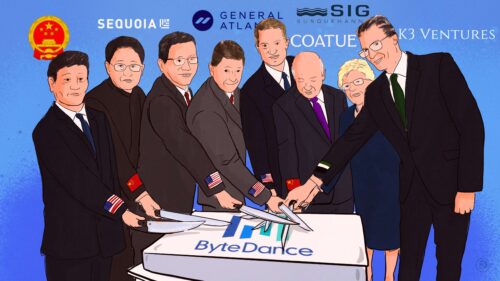‘Can we ban iPhone in retaliation?’ Chinese internet reacts to TikTok hearing in the U.S.
As TikTok’s CEO Shou Zi Chew endured a half-day of grilling before a U.S. Congress committee over national security concerns, the Singaporean executive was showered with praise on Douyin, the Chinese version of TikTok, for his fluent English, calm demeanor, and courage to stand up against what many described as “anti-China tactics.”

On Thursday, TikTok’s CEO Shou Zi Chew (周受资 Zhōu Shòuzī) fielded more than five hours of intense questioning by dozens of U.S. lawmakers in a high-stakes hearing with the House Energy and Commerce Committee, as calls for a forced sale of its U.S. operations or a nationwide ban gained momentum in Washington.
At the hearing (our preview here, video here) Chew was forced to defend his company’s handling of sensitive U.S. user data, its content moderation practices, and — most importantly — the app’s relationship with its Chinese owner ByteDance, and with the Chinese government. Chew spent much of the hearing attempting to push back assertions that the app or its Beijing-based parent are tools of the Chinese government.
“Let me state this unequivocally: ByteDance is not an agent of China or any other country,” Chew said. When asked about whether TikTok censors content that is critical of China, Chew firmly replied, “That kind of content is available on our platform. You can go and search it.”
Assessments of Chew’s performance have been polarized — depending on who you ask. Wall Street analysts reportedly slammed the testimony, calling it a “disaster” moment for TikTok, while the Washington consensus seems to be that the hostile spectacle will likely deepen the U.S. push to ban the app. On the other hand, Chew was applauded and embraced by TikTok users, who derogatorily called the legislators at the hearing “boomers” who are “embarrassing.”
On the day of the hearing, China directly responded to the TikTok saga for the first time since it started. At a press briefing, Shù Juétíng 束珏婷, a Ministry of Commerce spokeswoman, said that a forced sale of TikTok would “would seriously damage investors from multiple countries including China” and hurt “confidence to invest” in the U.S. “If the news is true, China will resolutely oppose it,” she said, without giving any indication what Beijing might do.
Despite China’s sizable presence during the hearing, the event wasn’t broadcast on Chinese television and there were few real-time discussions about it. However, on Friday morning, as domestic news outlets churned out coverage of the event, it quickly became a hot topic on Chinese social media, with some snippets from the hearing going viral on Douyin.
Nationalist rag the Global Times waded into the fray with an editorial that described the hearing as “a dark moment in the modern history of business,” a dramatic performance orchestrated by “veteran actors in Washington’s political theater,” and “a revelation of Washington’s ugliness, arrogance, and hostility towards China.”
“It’s certain that no matter what evidence TikTok provides, these American congressmen can never be persuaded. It’s like you can never wake up someone who pretends to be asleep,” it wrote. “The U.S. has exhausted all legitimate means to acquire TikTok but to no avail. Now it wants to steal it from us. This behavior makes it look like a barbarian intruding into a civilized society.”
On Weibo, where the hashtag “TikTok hearing” (#TikTok 听证会#) has been disabled but discussions about the topic are still allowed, Hú Xījìn 胡锡进, the former editor-in-chief of the Global Times, denounced the hearing as a one-way interrogation instead of a reasonable dialogue. In a post that has so far received almost 10,000 likes, Hu urged TikTok to fight till the end. “TikTok must never surrender. It has to see things through. Even if it fails in the end, it should die while standing.”
On Douyin, TikTok’s Chinese sibling, clips from the hearing — especially those showing Chew being hit by frustratingly ill-informed questions — have been making the rounds. Many accused the congressmen in attendance of being rude to the CEO and unwilling to listen, while praising Chew for maintaining his composure throughout the questioning.
Under a video of Rep. Anna Eshoo (D-Calif.) asking about TikTok’s data security plan, posted by the China Daily, many criticized her for repeatedly interrupting Chew’s response and being rude in general. “She has no manners. Why did she cut Chew off so many times?” one Douyin user raged.
Under another clip shared by Shanghai-based online news outlet Kan Kan News, which shows a Chinese news anchor calling out out-of-touch questions during the hearing, a Douyin user mocked Rep. Richard Hudson (R-NC), who asked Chew whether TikTok accessed the home WiFi network of a user. “Apple devices access my home WiFi. Can it cut ties with the U.S.?” the person ridiculed, while another person pleaded, “Can someone upload the entire hearing? I need to see how absurd this is!”
Having kept a relatively low-profile during his two years as Tiktok’s top executive, Chew’s appearance in front of the Congress marked the first time that many Chinese people learned about him. Born and raised in Singapore, Chew, 40, holds an MBA from Harvard. He interned at Facebook while it was still a startup, and then served as the chief financial officer of Chinese smartphone company Xiaomi before joining TikTok in 2021.
The hearing has made a star out of Chew on the Chinese internet, with scores of commenters praising his fluent English, calm demeanor, and courage to stand up against what many described as “anti-China tactics.” “The amount of patience this man possesses is insane. What a gentleman,” a Douyin user wrote.
Although Beijing’s opposition to a forced sale of TikTok hasn’t gone beyond words, Chinese internet users seem to have plenty of suggestions as to how China can interfere. “Can we ban iPhone in retaliation?” a Douyin user commented, while another one remarked, “Don’t forget a bunch of American companies like Apple, Tesla, and Microsoft all have businesses in China. We haven’t shown all the cards in our hand yet.”






